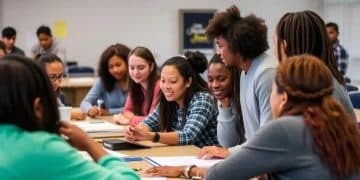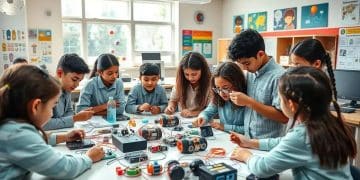College preparedness programs for first-generation students

College preparedness programs for first-generation students provide essential resources, mentorship, and community support to enhance their academic success and increase graduation rates.
College preparedness programs for first-generation students are designed to bridge gaps and enhance readiness for higher education. Have you ever wondered how they truly impact students’ journeys? Let’s dive into their benefits.
Understanding college preparedness programs
Understanding college preparedness programs is essential for helping first-generation students succeed. These programs play a critical role in providing resources and support that guide students on their journey to higher education. For many students, entering college is a significant challenge, especially when they are the first in their families to take this step.
What Are College Preparedness Programs?
College preparedness programs are designed to equip students with the necessary skills and knowledge for academic success. These initiatives often include workshops, mentoring, and various resources tailored to meet the unique challenges faced by first-generation students.
Key Components of These Programs
These programs typically focus on several essential areas:
- Academic support: Tutoring and study skills workshops are common features.
- Financial literacy: Students learn about budgeting, scholarships, and financial aid.
- Career planning: Programs help students explore potential career paths and internships.
- Social integration: Activities that promote connections among peers enhance their college experience.
Many of these programs also build strong community ties that encourage students to share their experiences and challenges. This sense of belonging can be vital for emotional support, which is crucial for success in college.
Benefits of Participation
Participating in college preparedness programs has numerous benefits. Students often report increased confidence and readiness as they approach college life. Moreover, these programs help participants develop important skills that can lead to academic success. They also foster resilience in facing obstacles that may arise during their college journey.
As first-generation students engage more with these resources, they find themselves better prepared for the realities of college. With mentorship and peer support, they can navigate their educational pathway with greater assurance. In turn, this preparation increases their chances of completing their degrees and achieving long-term goals.
The importance of mentorship for first-generation students

The importance of mentorship for first-generation students cannot be overstated. Having someone to guide and support these students can make a world of difference. Mentors provide valuable insights that help first-generation students navigate the complex world of higher education.
Why Mentorship Matters
Mentorship offers more than just academic guidance. It fosters a sense of belonging and community, which is crucial for first-generation students. They often face unique challenges that can be overwhelming. A mentor can help them feel less isolated.
Key Benefits of Having a Mentor
Some of the main benefits include:
- Personalized support: Mentors understand the specific challenges faced by first-generation students.
- Increased confidence: Having someone believe in them encourages students to take risks and strive for their goals.
- Networking opportunities: Mentors can connect students with professionals and resources that can enhance their educational experience.
- Academic improvement: Mentors often share study strategies and resources that promote better grades.
By having a mentor, first-generation students can gain critical skills that contribute to their success. They also learn to advocate for themselves, which is essential in college and beyond. When students feel empowered, they are more likely to persist in their studies and achieve their dreams.
Mentorship programs can vary widely, but they all share a common goal of supporting students. Whether through formal programs or informal relationships, the guidance provided can lead to lasting positive change. Many successful first-generation college graduates credit their mentors as a key factor in their achievements.
Key resources available through these programs
Key resources available through these programs are vital for the success of first-generation students. These resources provide essential support and create a more inclusive environment. Programs often offer a variety of tools tailored to help students thrive in higher education.
Types of Resources Offered
Many college preparedness programs include several types of resources that cater to students’ diverse needs:
- Tutoring services: These programs usually provide access to tutoring in various subjects, helping students enhance their academic skills.
- Workshops: Workshops covering topics like time management, study strategies, and writing skills equip students with the tools they need to succeed.
- Academic advisement: Students can receive guidance on course selection, majors, and career paths from academic advisors.
- Financial aid assistance: Programs often help students navigate financial aid options, including scholarships and grants.
Access to these resources can significantly ease the transition into college life for first-generation students. For example, academic advisement can clarify confusing degree requirements, allowing students to create effective educational plans.
Supportive Environment
In addition to educational resources, many programs provide a supportive community. Increased peer connections help facilitate learning and create lasting friendships. This support network can offer encouragement during challenging times and celebrate successes together.
Furthermore, access to mental health resources is often integrated into these programs. Counseling services help students manage stress and develop coping strategies. This holistic approach promotes not just academic success but also overall well-being.
With these key resources, first-generation students gain essential skills and knowledge. They are better prepared to face the challenges of college life, leading to higher retention and graduation rates.
Success stories from participants

Success stories from participants highlight the transformative impact of college preparedness programs. These stories inspire future students and demonstrate how support can lead to significant achievements.
Impactful Journeys
Many first-generation students have shared how these programs changed their lives. For example, Maria, a participant, struggled with balancing work and studies. Through mentoring, she learned time management skills that helped her excel in her courses. Maria’s experience showcases the positive influence of guidance in academic success.
Real-Life Examples
Here are a few more success stories:
- John: After joining a college preparedness program, he received help with his college applications and financial aid. As a result, he got into his dream school and earned a scholarship.
- Aisha: With the support of her mentor, she developed strong study habits, which led her to achieve high grades and gain acceptance into a prestigious internship program.
- David: Through workshops, David learned about networking and career opportunities. Now, he has secured a job at a top company before even graduating.
These stories reflect how college preparedness programs build confidence and equip students with valuable skills. Participants often feel more prepared to face the challenges of higher education and beyond. The encouragement and resources provided contribute to their overall growth.
Additionally, alumni of these programs frequently give back by mentoring new students, creating a cycle of support. This creates a lasting impact within the community, proving that success is achievable when guidance and resources are available.
FAQ – Frequently Asked Questions about College Preparedness Programs
What are college preparedness programs?
These programs are designed to help first-generation students gain the skills and resources needed for success in higher education.
How do mentorship opportunities work?
Mentorship programs pair students with experienced mentors who provide guidance, support, and encouragement throughout their college journey.
What kind of resources are available through these programs?
Resources may include tutoring, workshops, academic advisement, and financial aid assistance to help students navigate their college experience.
Can success stories from participants motivate new students?
Absolutely! Success stories demonstrate how these programs can impact lives and inspire new students to pursue their educational goals.





